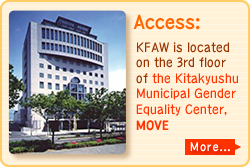| We visited the Incheon Development Institute (IDI) in Incheon Metropolitan City, Korea. We had concluded an Agreement on Exchange and Cooperation with the organization in September 2011. The purposes of the visit were to request IDI President KIM Min-Bae to deliver a lecture in Kitakyushu City, and to explore possibilities to promote interaction between women’s organizations in Incheon Metropolitan City and those in Kitakyushu City. |
August 29 (Wed.) : Departure for Incheon Metropolitan City
Our flight scheduled to leave Fukuoka Airport at 10:30 a.m. was considerably delayed due to the typhoon No. 15. According to an announcement made at the airport, the departure time would be delayed to 3:30 p.m. Worrying that the flight might be canceled, we waited for the time of our flight for as many as six hours at Fukuoka Airport.
Leaving Fukuoka Airport finally at 3:40 p.m., our flight arrived at Incheon Airport at 5:30 p.m., way behind schedule. Since we had been originally supposed to visit the Incheon Development Institute (IDI) at 2:30 p.m. to have a meeting with President Kim, we were very late for the appointment. Before leaving Japan, we had informed IDI that our arrival would be delayed. To our surprise, President Kim himself welcomed us at Incheon Airport.
Due to the delay in our schedule, we decided to have a meeting at a cafe in the airport. The airport was very large, making us feel that it was not an exaggeration to say that it is an Asian hub airport. After walking within the airport a little while, we arrived at the cafe, the “temporary venue” for the meeting. We would like to express our appreciation to President Kim and other IDI members concerned, who managed to make time for us despite their busy schedules.
President Kim willingly accepted our request for him to deliver a keynote lecture at the 5th Japan-Korea Seminar to be held in Kitakyushu on February 2, 2013. Additionally, he recommended Ms. Park, Inn hea as a panelist for the 23rd Kitakyushu Conference on Asian Women to be held on November 10, 2012. Born in Incheon Metropolitan City, Ms. Park, Inn hea dedicated herself to establishing a law against sexual violence in Korea. It is expected that both of them will deliver significant lectures in Kitakyushu. We truly look forward to their lectures.
Moreover, President Kim shared many interesting topics with us. For example, in Incheon, communities of defectors from North Korea have been established in some parts of the urban area. There are now problems that many of these defectors cannot adapt themselves to Korean culture, and that some children of defectors cannot keep up with curriculums provided at school. Since such information is not usually available in Japan, it was invaluable.
In Korea, there are many working immigrants from Southeast Asia, causing a wide variety of problems regarding multicultural coexistence. In rural areas, there are also problems related to foreign wives. President Kim said that the largest problem regarding multicultural coexistence was a problem of prejudice.
The 5th Japan-Korea Seminar to be held in February 2013 will feature IDI President KIM Min-Bae’s keynote lecture with the theme of multicultural coexistence. It is expected that his lecture will include invaluable information regarding Korea, such as that provided above. Please do not miss this opportunity!
August 30 (Thursday): Visit to Facilities
【Visit to the Incheon Development Institute (IDI)】
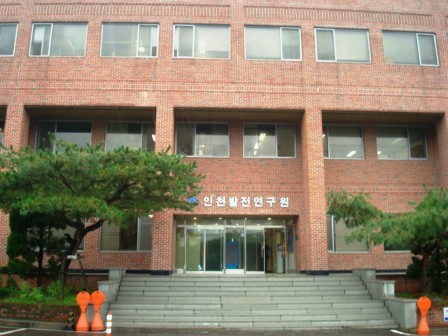 |
| IDI (front gate) |
Although we had been originally scheduled to visit IDI on the 29th, we hastily changed the schedule and visited the organization on the morning of the 30th. While typhoon No. 15 had passed through, another one was approaching and it was raining. Although fortunately the wind was not so strong, we were worried that our flight to Japan might be canceled. In the threatening weather, we visited IDI guided by Mr. Lee, Choong Suk of IDI.
IDI is a survey and research organization that works on formulating local policies for Incheon Metropolitan City and solving the city’s various problems. The organization consists of three sections: the General Planning Division, the Policy Research Division, and the Incheon Gender Policy Center, which carries out surveys and research for policies and educational programs related to the enhancement of status of women. Approximately 100 people are enrolled as researchers at the organization, some 30% of whom are women. Recently, the number of women researchers there has been increasing.
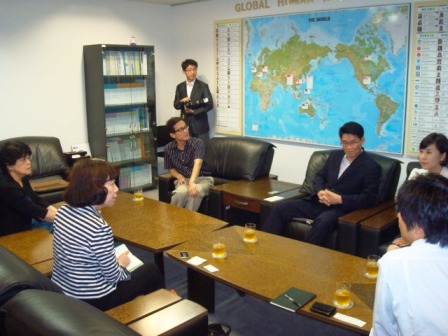 |
| Meeting at an IDI conference room |
IDI will place further focus on gender-related research. There is a plan to merge the above-mentioned Incheon Gender Policy Center with the Women’s Culture Centers (which are located in four areas in Incheon and have functions regarding women’s social, sports, and cultural education), to form an independent organization named the Women and Family Research Institute. After the merger, the new institute is expected to emphasize the function of fostering leadership among women (developing female politicians.) Meanwhile, Korea is now experiencing a decline in the number of children, the speed of which is faster than that in Japan. A childcare policy to overcome this decline is the largest political problem that the country is now confronting.
【Visit to the One-Stop Support Center 】
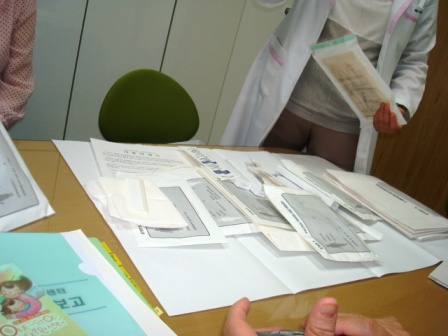 |
| Evidence collection kit |
The visit to IDI was followed by a visit to the One-Stop Support Center, established at the Incheon Metropolitan City Medical Institute. This center was founded under a three-way agreement between the Incheon medical institute, Incheon Metropolitan City, and Incheon local police, in order to promptly respond to violence against women, domestic violence, sexual violence, and school violence, and to minimize the suffering of victims.
A doctor, a female police officer, and a counselor are stationed at the center to provide victims with necessary services including medical, counseling, investigation, legal, and many other services on a round-the-clock basis. This year marks the sixth anniversary of the establishment of the center, which now has 12 full-time staff members. While 98% of reports to the center are from the police, there are cases where victims themselves contact the center or victims are introduced to the center by NGOs protecting such victims.
The first thing that the center does after receiving a report is to collect evidence as to the relevant violence. This is a crucial step. In case of a sexual assault, evidence needs to be collected promptly within 72 hours. In this regard, the center has a wide variety of evidence collection kits to enable a systematic evidence collection. With appropriate evidence, the possibility that the offender will be prosecuted reaches nearly 100%.
The One-Stop Support Center emphasizes helping victims to regain their mental stability. The center’s professional staff members provide mental therapies to help victims return to their normal lives as early as possible. While such mental therapies include picture painting therapy and music therapy, support regarding physical aspects includes care concerning injuries, sexual diseases, and contraception.
With the number of violence crimes increasing in Korea, the number of cases where the center provided counseling for victims reached 1,355 last year. The penalties imposed on offenders in Korea are tougher than those in Japan. There are even cases where offenders are subjected to chemical castration (using chemical drug). Moreover, there are cases where a judgment obligates the offender to wear a GPS tracking device. The visit to the center provided us with a lot of food for thoughts.
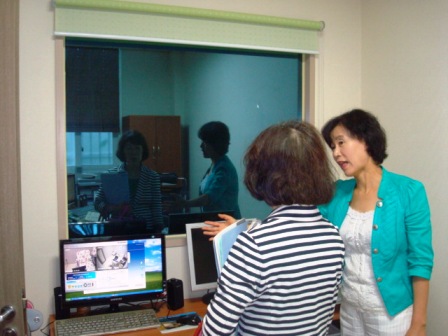 |
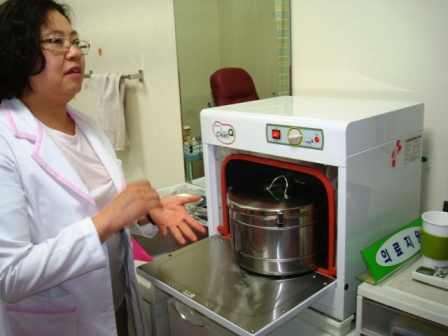 |
| Room for questioning a victim | Container for evidence |
【Visit to the Sunflower Child Center】
The above visit was followed by a visit to the Sunflower Child Center, established at Gil Hospital, a private medical institute (Gachon University). The center provides medical and legal services for child sexual violence victims and their families. This year marks the third anniversary of the establishment of the center. While the center originally provided its services for children under 13, the center has raised the age limit to 18 this year.
The annual number of cases where the center offers counseling has been approximately 200 so far. However, due to this year’s increase in the age limit to 18, the number of cases where the center provided counseling in the first half of this year already reached 150. Approximately 60% to 70% of child victims who visit the center contact the center on their own by phone or the internet. While many of small child victims are accompanied by their parents, there are cases where the One-Stop Center, schools, or child facilities contact the center.
It is a great pity that there are many cases where an offender is acquainted with the child victim. The percentages of an offender being the victim’s family member, teacher, and another acquaintance are 25%, 25%, and 20%, respectively. If an offender is the victim’s family member, the approach of family separation is basically applied (only the offender is separated). Although there are shelters for child victims of sexual violence, they are not only for such children, but also for child abuse victims and orphans, making the number of shelters insufficient nationwide.
While this center provides support for approximately six months, some child victims need one year of support. The center offers a wide variety of legal support services, including those related to reporting to the police, promoting trials, and testifying on behalf of victims, as well as financial support for trials. This year, the center has launched a legal support system in which lawyers serve as a proxy of victims’ parents in order to cover the shortage of their legal expertise.
Since the center is a facility for children, it employs mental therapies using a sand box, dolls, musical instruments, and other items. Such therapies include a therapy to identify the mental state of a child victim by checking how he/she plays in the sand box or with the dolls in the care room, as well as music therapy (in which he/she plays musical instruments freely).
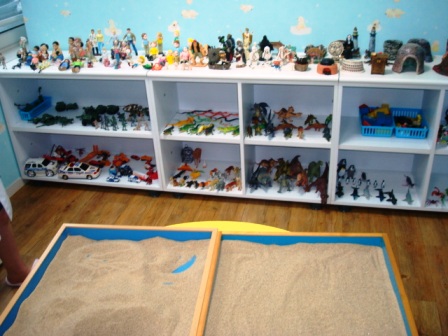 |
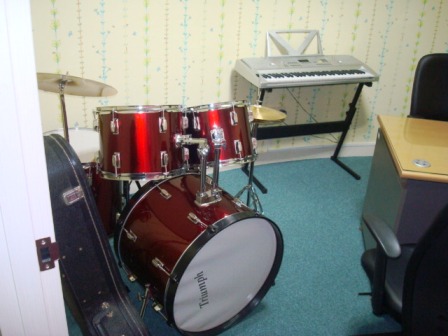 |
| Care room (sand box) | Care room (music therapy) |
【Meeting with the Incheon Council of Women】
Finally, we met with representative members of the Incheon Council of Women in Incheon. Although we had been originally scheduled to meet with them on the 29th, the schedule was hastily changed to the 30th to have a lunch-time meeting.
While eating lunch, we listened to a wide variety of invaluable stories. Women’s organizations in Korea are very active. With their networks formed across the nation, such organizations provide policy recommendations to the Korean government, indicating that they are politically influential.
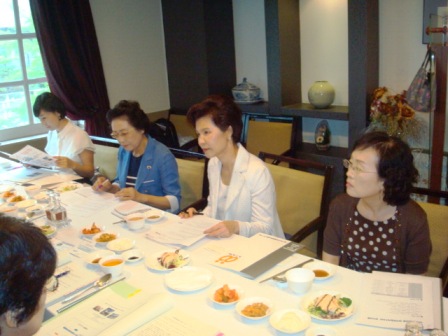 |
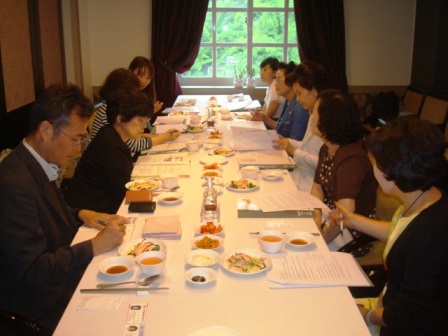 |
| Representative members of the Incheon Council of Women | Lunch meeting |
Consisting of 25 organizations in the city, the Incheon Council of Women promotes women’s participation in society, gender equality, and family well-being. The association’s specific activities include the following:
- Operating Women’s Local Autonomy University (developing women politicians)
- Promoting a greenery development campaign to reduce the amount of kitchen garbage (use of many more compost systems)
- Developing reading instructors for children
- Introducing models of women leaders in Incheon Metropolitan City (holding interaction events for women leaders)
- Monitoring mass media (checking for expressions of prejudice against women)
- Promoting a family well-being campaign
Thus, the association conducts a wide range of activities.
Additionally, the Incheon Council of Women directly operates a counseling center for victims of domestic violence and sexual violence. Caseworkers and counseling staff working for the center are directly employed by the council. Furthermore, the council manages a monitoring team to check the appropriateness of gender expressions used by mass media. The team consists of staff dispatched by each member organization of the council. What surprised us was that, although the council receives some grants from the city, the cost of carrying out such a wide variety of activities is basically covered by the council’s membership fees.
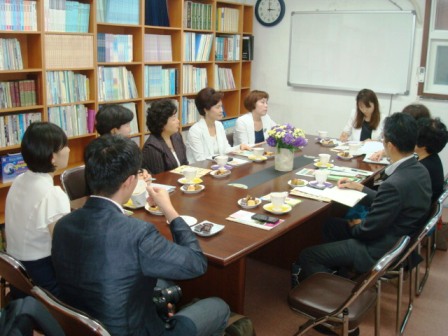 |
| At the Women’s Center |
After the lunch, we moved to the Women’s Center, where the Association of Women’s Organizations is headquartered. The association willingly agreed to our proposal to promote interaction with women’s organizations in Kitakyushu. According to the association, senior members of the Association of Women’s Organizations visited Kitakyushu in 1997 and 2000, and they were impressed with various efforts promoted by Kitakyushu as an environmental city.
It is excellent if interaction between Japan and Korea leads to invigoration of activities by women’s organizations in both countries. We hope that our visit will serve as the first step toward interaction between women’s organizations in Japan and Korea!
【Extra Episode: At Incheon Airport (Flight to Fukuoka)】
After the end of the meeting with the Association of Women’s Organizations, we headed for Incheon Airport to return to Fukuoka. With the rain easing up and the wind stopping, we thought that our flight would leave Incheon. Despite the rain, members of the Association of Women’s Organizations saw us off. Moreover, an IDI member was kind enough to drive us to the airport.
After reaching Incheon Airport, we said good-bye to the IDI member, and then headed for our boarding gate. Although there was a sign indicating an approximately one hour delay of our flight to Fukuoka Airport, it seemed certain that the flight would leave. Our schedule during the visit was completely disrupted by the typhoons, but it seemed that we could return to Japan on the 30th as scheduled, making us relieved. However, another trouble occurred at the baggage counter!
When we took our baggage to the counter and presented our tickets to a counter staff member, the staff person suddenly went silent, and frowned. While we were worrying about what was happening, the staff person left her seat, saying to us “Hold on a minute.” We waited for approximately 10 minutes. The staff person came back, but went on to talk about something with another staff member. We had never expected that we would be stranded at such a place as the baggage counter. After a little while, the staff person came to us with new tickets, saying,
“You are lucky. Your tickets have been exchanged with business class tickets. Use the new tickets.”
How lucky! Our economy seat tickets were upgraded to business class seat tickets. We had no idea what was going on, but our airline company might have made a mistake by double-booking the economy seat tickets. Anyway, we returned to Japan in the luxurious business class seats.
Although our original schedule was changed drastically due to the typhoons, our visit to Incheon was quite significant thanks to cooperation with IDI staff and other persons concerned.


